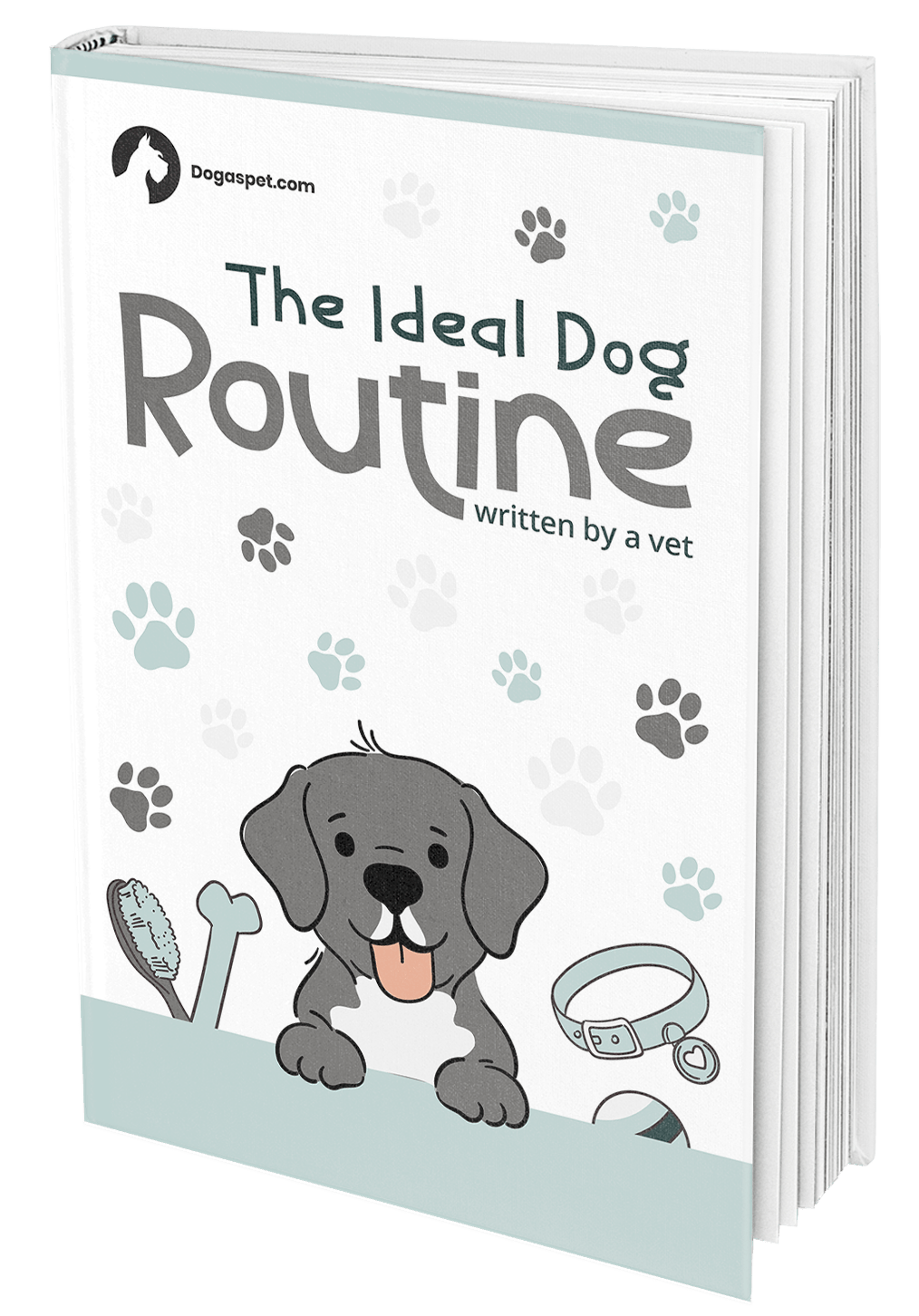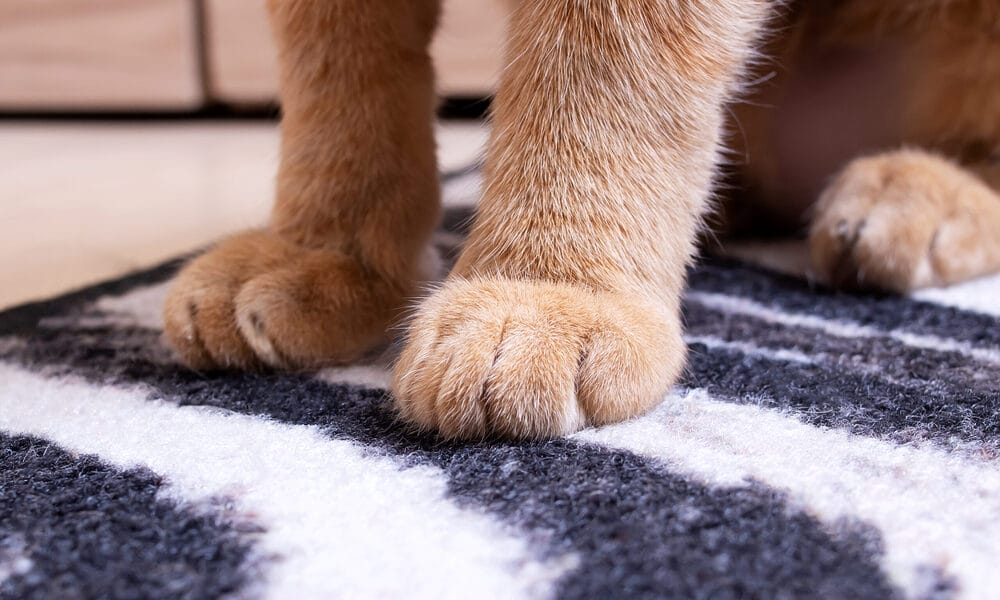
Dig, dig dig, scratch, scratch, scratch – it’s a dog thing, right? While these actions aren’t completely exclusive to dogs, they definitely can be a “dog thing”, but they could also be something else. Don’t worry, most of the issues aren’t too concerning, but they still need to be addressed before you can put a stop to them.
Why Does My Dog Scratch the Carpet?
We’ve stressed about figuring out the why, so here are the top reasons why your dog is digging away indoors.

It’s Instinct

Sometimes it’s just instinct and dogs will be dogs. Dogs have a natural instinct to dig, and their ancestors did this in the wild centuries ago for various reasons such as hiding food or searching for prey. Although your dog may not have to forage for food as wolves did, the instinct to dig is still there.
We may treat dogs like they’re our best friends or children, but they are still animals with different predispositions to us and it’s important to recognize that.

Play and Exploration
Digging can be fun! We’re pretty sure most of our readers have had fun digging holes at one time or another during adolescence, and it’s the same for dogs. The scratching could be due to play or exploration. Your dog could be wondering what lies beneath the carpet.
Dogs are very curious animals, and we think a phrase similar to “curiosity killed the cat” would work on dogs as well. While we do want to correct the behavior, we don’t want to stifle their natural instinct to explore the world around them.

Nesting

Another reason is nesting. It’s very endearing to see your dog scratch away at the carpet, maybe even blankets on the bed or anything soft to create a comfortable sleeping spot. Ultimately, your dog is trying to make the area as cozy as possible before calling it a night.
Nesting is not only very cute to watch, but it also signals that your dog is very attached to his living space. This is a good thing because he sees your/his home as his home, his territory, a place he loves. In other words, great work pawrents!

Hunting and Marking
Remember when we mentioned the issue could be ancestral? Well, let’s dive a bit deeper into it. Dogs with a high prey drive could dig when they smell or sense something under the carpet.
Dogs could also be scratching away to mark the area with their scent as they would by urinating outdoors. Another reason is prey drive.
It’s a little scientific, but dogs actually have scent glands on their paws, more specifically, on their paw pads. Yep, it’s not just the butt that emits your dog’s special smell and this is why scratching can be akin to dogs marking their territory with their scent.

Health Problems
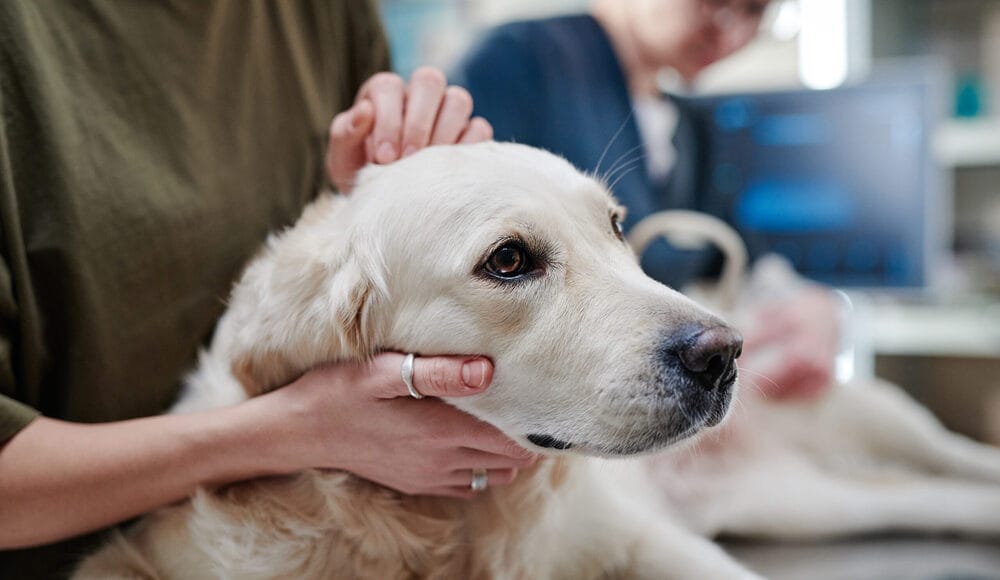
Lastly, your dog could be suffering from underlying health problems that you are not aware of. It could be something as mild (but still uncomfortable) as allergies, or something more serious such as physical pain.
We would suggest contacting your vet if you suspect your dog is digging due to illness. You can usually tell the scratching is abnormal if it deviates from your dog’s normal behavior. If you cannot seem to find a trigger or reason for your dog’s digging and our examples above don’t seem to fit either, then that’s when there’s a good chance it’s health-related.
Is Your Dog Scratching the Carpet Seen as Bad Behavior?
No, we wouldn’t necessarily classify dog digging as bad behavior, especially if the reason behind it is quite innocent such as instinct passed down for generations.
We would only call it “bad behavior” if it is boredom or destruction. However, parents have to bear some of the responsibility if this is the case because a well-exercised/stimulated dog is a well-behaved one.
Dog scratching can also lead to a lot of other issues such as:
- Property damage – If your dog digs right through the carpet or the scratching accompanies chewing and destroying your property, that could be a problem.
- Safety – Your dog’s safety could also be at risk because broken pieces can be ingested and the wooden floors underneath could splinter and pierce your dog’s paws. We’d also suggest proper nail care so your dog doesn’t injure himself when scratching. Longer nails can also snag on carpets, causing your dog even more discomfort.
- Aesthetics – Things can look quite shabby and unkempt if your dog starts destroying all the carpets and rugs. While it’s not a big deal functionally, we’re pretty sure you would prefer an undamaged carpet and the cost to replace broken property is a consideration as well.
- Negative reinforcement – If you don’t address the issue, it could be seen as a type of negative reinforcement. Allowing the behavior to continue will also make it more difficult to correct in the long run.
- Decline in your dog’s well-being – Aside from negative reinforcement, your dog’s well-being could be at stake if you don’t identify the issue. Chronic anxiety could lead to poor mental health for you and your dog.
Tips to Stop Your Dog Scratching the Carpet
Now we get to the good stuff. How do we stop this behavior to keep our fur babies safe and our carpets looking new?

Understand Why
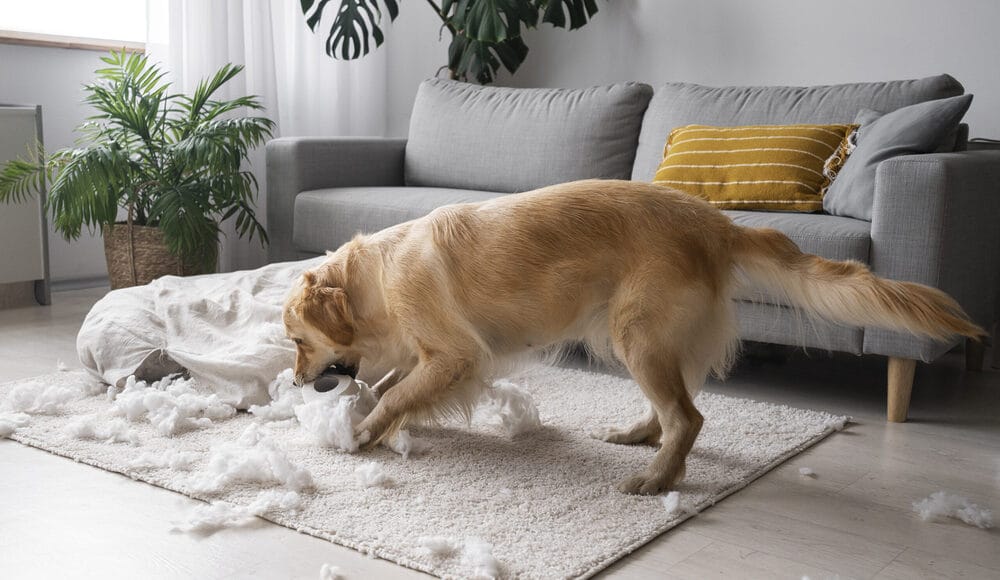
The first step in addressing most things in life is understanding the reason behind it. We already covered this in more detail above, but this section is here as a reminder to not correct something harmless such as nesting, or reprimand your dog for something that is natural – unless it gets out of hand.
A great tip to help you figure out exactly why your dog is scratching is to pay attention to when he does it and his body language. If he does it right before he lies down for a nap, then you can be sure it’s a nesting habit.
If your dog is doing it out of fear, it will be accompanied by a trigger. If you’re pretty sure it’s due to instinct, then you can try to redirect the behavior onto more appropriate surfaces such as a rug you bought specially for this purpose or a dog nail scratch board.
A bit of a spoiler alert for our last point in this section, but if you can’t seem to pinpoint the reason why, then you may want to seek professional help from a vet or trainer.

Add More Exercise and Mental Stimulation
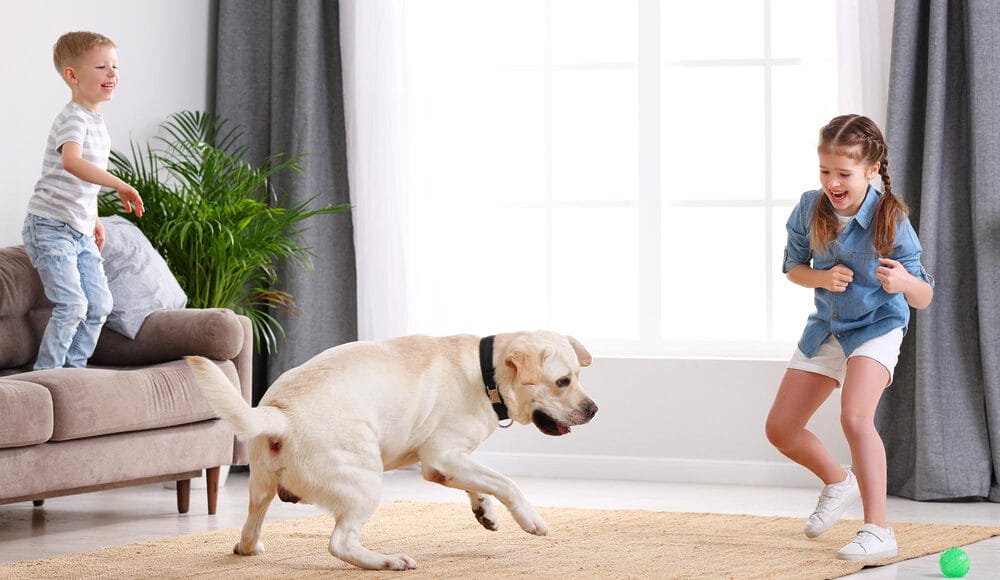
The ultimate “cures” to boredom, anxiety scratching, and the like are adequate exercise and mental stimulation. We get it, sometimes it’s raining out or you’re just swamped with errands and work on some days, and that’s okay. While it’s important to prioritize our own needs sometimes, you’ll also find it easier on you (especially if you have a needy dog) if you take care of him first.
By take care we mean give him a good walk or play a puzzle game with him before getting down to business or taking some time for yourself. Not only will your dog be tired out, well-behaved and leave you alone, your carpet and the rest of your house will remain intact.
Remember that each dog is different and the amount of exercise they need will vary depending on the factors we mentioned above. Too much of a good thing can still be bad and an over-exercised dog could suffer from injury, over-exhaustion, dehydration, joint problems and more.
Everything in moderation is the key!

Teach New Tricks and Train
Following on that thought, training and teaching your dog new tricks also count as mental stimulation. Obedience training, agility, puzzle games and toys, and enrichment activities will all go toward your dog’s daily mental quota.
Your dog loves you and wants to please you. There are a ton of breeds out there that need a task to feel satisfied, useful, helpful, and all the positive adjectives like working, sporting and hunting breeds (and these breeds account for a lot of dogs out there).
Simple commands and basic tricks like “sit”, “stay”, and “heel” are not only great places to start, but they can also keep your dog safe and well-mannered.

Invest in Chew Toys

If the problem is excess energy, then invest in chew toys and stuffable toys to redirect your dog when he starts scratching. When he gets going on the carpet, distract him with a Kong toy stuffed with frozen peanut butter. Your dog can’t really dig through the ground to whatever he smells or explore the way he wants to indoors, but he can work his way around a good toy.
There are a lot of recipes and homemade options out there that you can try in terms of stuffable treats. The toy you invest in should be made from durable materials, especially if your dog is an avid chewer. Look for ones made out of silicone, rubber, or other materials designed for chewing that are pet-safe and non-toxic.

Stick to a Routine
Dogs love routine. If your dog is scratching due to anxiety, think back to when you first got your puppy and everyone, all the training manuals, videos and experts were telling you to establish a routine. A consistent daily regimen helps you predict and gauge your dog’s needs and for him to understand yours. Predictability helps relieve stress in your dog because he knows what’s happening and what’s coming.
With this reduced anxiety, your dog will experience less of a need for carpet scratching and become more well-rounded. Giving clear boundaries and expectations to your dog can also help with other training such as crate, bathroom and behavioral training.
Having a routine has other benefits as well such as grounding your dog when the environment changes like during a move to a new home. Your dog will be able to adjust much faster and easier if you stick to the same schedule.

Ask a Vet or Trainer
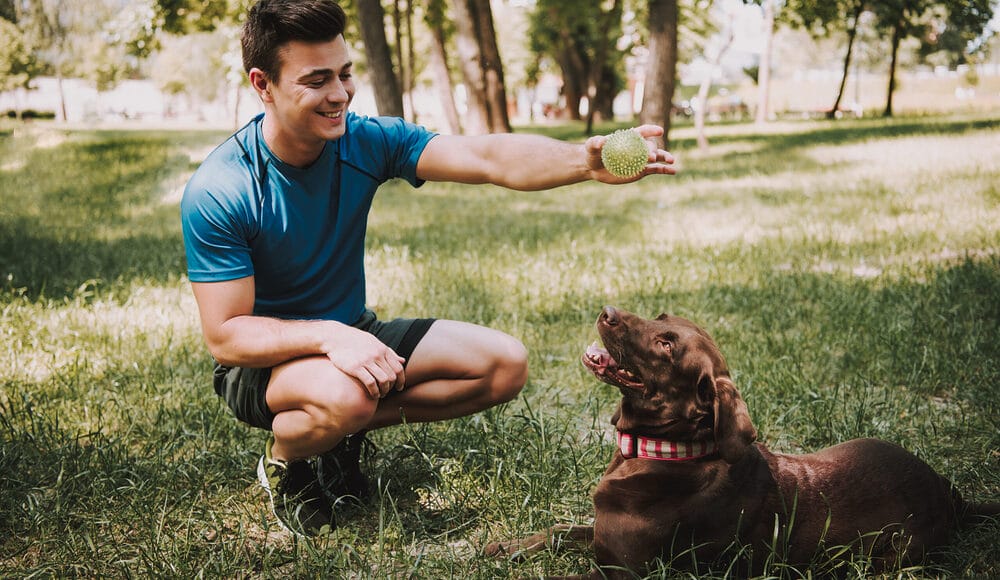
When all else fails, sometimes you just have to turn to the professionals. Even despite your best efforts, sometimes it’s difficult to curb a behavior without expert assistance. Whether it’s to figure out the reason behind the scratching or to stop it, an animal trainer or behaviorist can help.
If it’s a medical issue, then you’d need to take your dog to the vet for a wellness check. This is when the veterinarian conducts a physical exam. It can be quite routine and could even encompass a simple blood and fecal test.
With the combined help of a trainer and, if necessary, a vet, your dog’s scratching problem should be addressed effectively. Their professional advice should be taken seriously and implemented consistently with patience for the best results.
FAQ – Frequently Asked Questions
We are coming to the end of this post, but before that – let’s answer some of the most frequently asked questions related to dogs scratching carpets.
Why do dogs scratch the floor?
Dogs can scratch the floor for a variety of reasons. Their ancestors used to dig to hide food, create comfortable sleeping areas and help with hunting. While dogs have long been domesticated by man, this instinct is still present in our pets.
Of course, there could be negative causes for floor scratching such as frustration, boredom, fear and anxiety. Assess your dog’s body language to pinpoint the reason for the behavior.
Will scratching the carpet damage it?
Yes, more often than not, continuous and vigorous carpet scratching will damage the surface. Over time, your dog’s nails could get at the fibers and ultimately unravel the carpet or lead to fraying and pilling. It’s also possible that your dog could dig a hole right through it!
Thankfully, the process of destroying carpet through digging is gradual, so you can catch it and stop it before the damage is irreversible.
Is it necessary to take my dog to the groomer to file their nails?
No, it’s not necessary to take your dog to the groomer to file his nails unless you can’t manage it at home. Dog nail trimming is not a widely enjoyed activity from your dog’s POV, but if you start from a young age, it’s easier for your dog to accept it.
Dog nail scratch boards are also a way to trim your dog’s nails, especially if you know he likes to scratch. All you need to do is redirect his scratching onto the emergy board, but it will take some training.
How can I tell if my dog is scratching the carpet out of anxiety?
In order to determine if your dog is scratching the carpet out of anxiety, you have to first observe his overall body language and surroundings. There are often other symptoms that come with carpet digging such as pacing, panting, whining and other signs of distress.
External triggers such as bad weather (thunderstorms, high winds, etc.,), fireworks, or when you leave the house could also cause carpet scratching. Sometimes dog anxiety requires professional training to fix.
Can training help prevent my dog from scratching the carpet?
Yes! Training is one of the best ways to prevent your dog from carpet scratching. Redirection is another good one to teach your dog what is acceptable and what isn’t. Remember to use positive reinforcement to communicate with your dog and differentiate between good and bad behavior.
Aside from training, it’s crucial to identify the reason for the scratching first, in order to address it in a healthy and correct way.
Conclusion
Understanding something as seemingly harmless as carpet scratching could be the key to diagnosing an underlying health issue or the first step to improving your fur baby’s quality of life. Of course, there is the chance that the reason behind it is really harmless, like nesting, but it’s still better to be safe than sorry.
Once you know why, it will be easier to plan a clear path to recovery through training, positive reinforcement, professional help or redirection. Your dog deserves a fulfilling life and we can help him achieve it by understanding his method of communication!

